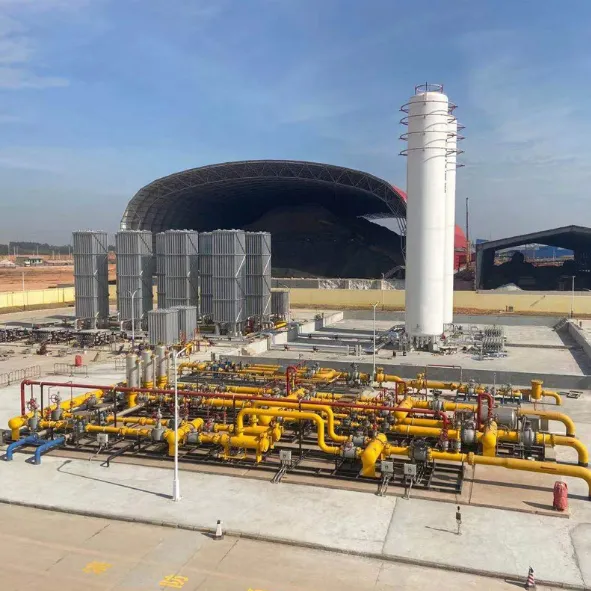
Feb . 26, 2025 14:55
Back to list
LNG and Gas Filtration: Key Elements for Cleaner Energy
Liquefied Natural Gas (LNG) is becoming an increasingly popular energy source globally, offering a cleaner alternative to traditional fossil fuels. As its use expands across the globe, effective filtration systems are essential to ensure the quality and safety of LNG and other gas systems. In this article, we explore the crucial role of gas filtration and the importance of the gas coalescer filter in ensuring that LNG systems function efficiently and safely.

Understanding LNG and Its Importance in Today's Energy Landscape
LNG, or Liquefied Natural Gas, is natural gas that has been cooled to a liquid state, reducing its volume by around 600 times. This makes it easier to transport and store, especially for regions that are not connected by pipelines. LNG is a cleaner alternative to coal and oil, as it produces fewer carbon emissions when burned for energy. As industries and power plants increasingly shift toward cleaner fuels, LNG plays a critical role in reducing environmental pollution and advancing sustainability efforts.
However, for LNG to be effective and efficient, it needs to be processed, stored, and transported in a way that ensures its purity. Contaminants such as water, solid particles, and other impurities can hinder its quality and operational efficiency. This is where gas filtration becomes indispensable. It ensures that LNG remains free of contaminants, thus safeguarding both the equipment and the environment.
The Role of Gas Filtration in LNG Systems
Gas filtration is the process of removing impurities, particulates, and moisture from natural gas, including LNG, before it is used in industrial applications, power generation, or vehicle fueling stations. As LNG travels through pipelines or is stored, it is exposed to various contaminants that can damage equipment, corrode pipelines, or even cause operational failures.
The primary purpose of gas filtration in LNG systems is to remove water, solid particles, and other contaminants that could harm gas flow, equipment, or reduce the quality of the fuel. Gas filtration ensures the integrity of the LNG by keeping contaminants out of the gas stream, thus protecting turbines, compressors, and other components involved in the delivery and use of LNG. A reliable gas filtration system is key to maintaining high-quality LNG and ensuring that the energy produced is both clean and efficient.
Gas Coalescer Filters: Essential for Effective Filtration
A gas coalescer filter is a specialized type of filter designed to remove liquids from gas streams. It works by collecting fine droplets of water and other liquids that may be present in LNG and causing problems such as corrosion or equipment damage. The gas coalescer filter works by capturing and separating liquid water or hydrocarbon droplets from the gas flow, allowing only clean, dry gas to pass through.
In the case of LNG, water is a major contaminant that can form ice, corrode metal surfaces, or even block pipelines. Gas coalescer filters are used to eliminate such water and other liquid impurities, ensuring that LNG remains in optimal condition for transportation and use. By preventing the accumulation of moisture, the gas coalescer filter helps maintain the efficiency and longevity of the infrastructure used in the LNG system. This is especially critical for industries that rely on LNG for power generation or as an energy source for vehicles.
The Importance of a High-Quality Gas Coalescer Filter in LNG Applications
A high-quality gas coalescer filter is indispensable for any LNG operation. Without it, the integrity of LNG systems could be compromised by contaminants that lead to equipment failure, safety issues, or environmental harm. A good gas coalescer filter ensures that only pure, dry LNG reaches the end users, whether in residential, industrial, or transportation sectors.
In industries such as power generation or shipping, where LNG is used to fuel turbines, engines, or other machinery, having a reliable filtration system in place is vital for optimal performance. The absence of a high-performing gas coalescer filter could lead to operational inefficiencies, increased maintenance costs, and even the potential for unsafe conditions.
Future Trends in LNG and Gas Filtration Technology
As LNG continues to grow in importance as a cleaner energy source, the demand for advanced gas filtration technologies will only increase. Future innovations in gas filtration systems, including more efficient gas coalescer filters, will help ensure that LNG remains free from contaminants, even as the energy market becomes more dynamic and complex.
With the increasing demand for LNG in the transportation sector, especially for fueling LNG-powered trucks and ships, filtration systems will need to be more reliable and capable of handling large volumes of gas under varying conditions. The future of gas filtration will likely include the integration of smarter, automated systems that provide real-time monitoring, ensuring that LNG quality is maintained throughout the entire transportation and usage process.
As we move towards a more sustainable energy future, LNG will continue to be a cornerstone of cleaner energy solutions. The evolution of gas filtration technologies, particularly gas coalescer filters, will play an essential role in ensuring that LNG remains a safe, efficient, and environmentally friendly energy option.
In conclusion, the proper management of LNG quality through efficient gas filtration and advanced gas coalescer filters is essential for maintaining the integrity of natural gas systems and ensuring that LNG continues to serve as a cleaner alternative to traditional fuels. With the growing demand for LNG, the role of filtration technologies will become even more critical, driving the future of cleaner, more sustainable energy solutions.
Latest news
-
Safety Valve Spring-Loaded Design Overpressure ProtectionNewsJul.25,2025
-
Precision Voltage Regulator AC5 Accuracy Grade PerformanceNewsJul.25,2025
-
Natural Gas Pressure Regulating Skid Industrial Pipeline ApplicationsNewsJul.25,2025
-
Natural Gas Filter Stainless Steel Mesh Element DesignNewsJul.25,2025
-
Gas Pressure Regulator Valve Direct-Acting Spring-Loaded DesignNewsJul.25,2025
-
Decompression Equipment Multi-Stage Heat Exchange System DesignNewsJul.25,2025

